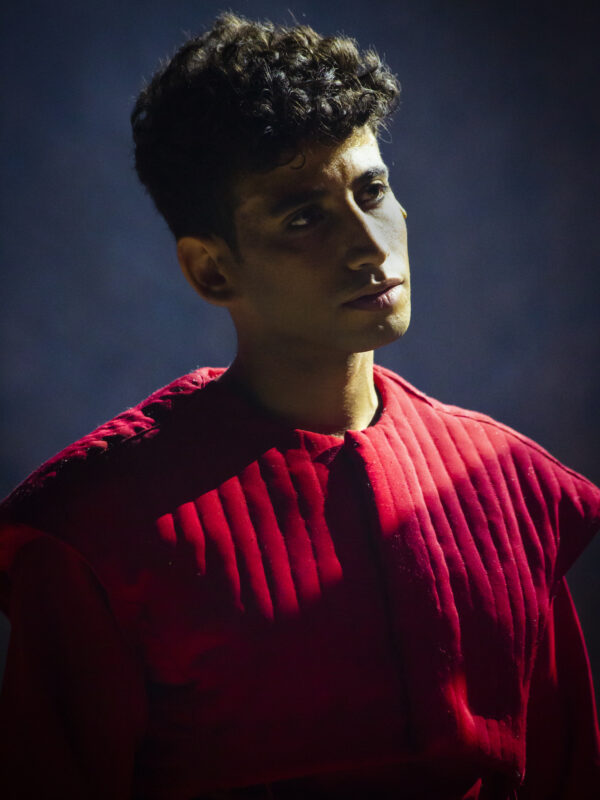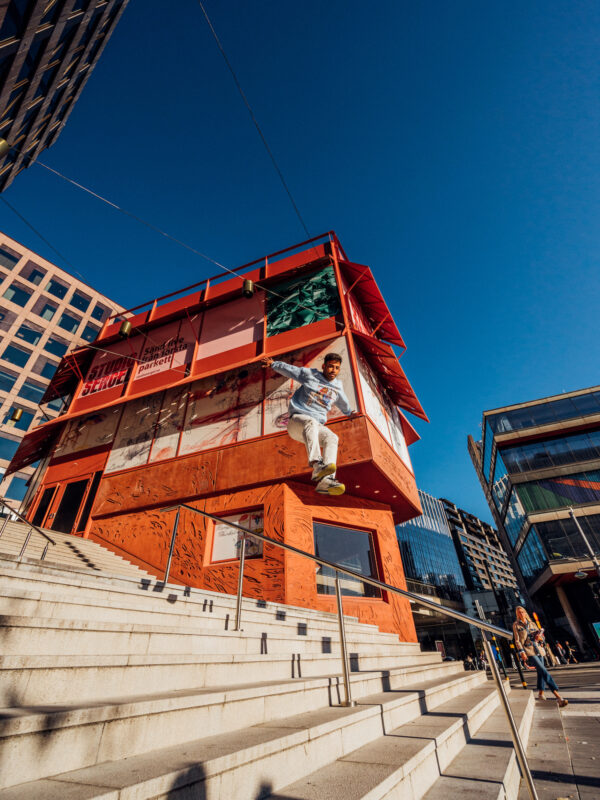
Ahmed Matar, known as “Matar,” is a Palestinian parkour athlete from the Gaza Strip, born on March 19, 1996.
At just nine years old, Matar’s journey into parkour and freerunning began after witnessing two young men, Mohamed AlJakhbir and Abdallah Inshasi, performing flips near his martial arts training spot. Inspired by their movements, he decided to explore parkour, a discipline that would soon become central to his life.
“With parkour, it feels like flying; even in Gaza, it allows a rare sense of freedom. While training, all worries fade away – the only focus is on perfecting a trick or a jump. Parkour became more than a sport; it was a new way of life. In the toughest moments, I’d envision the next jump, and that focus helped change my mindset entirely.”
Since beginning parkour, Matar’s life has been shaped by the sport, from spending countless hours with his team to constantly discussing new moves and techniques. His family often expressed concern for his safety, aware of the sport’s risks, especially in Gaza’s challenging environment. The team had to train in cemeteries and atop building rubble due to limited space and restrictions from local authorities, who misunderstood their intentions.
The path wasn’t easy; initial public perception was cautious and often negative, viewing the sport as hazardous, especially since they lacked equipment or a dedicated training space. Practicing outdoors in unpredictable conditions added to the risks. But despite Gaza’s difficulties—wars, destruction, and the ever-present uncertainty of life there—Matar and his team have persevered, carving out a place for parkour amidst adversity
Since childhood, there was a dream of traveling beyond Gaza. Matar began making and sharing videos on Facebook, showcasing his parkour skills. The positive response, high viewership, and support from fans brought joy and inspired him to pursue his passion further. He started training with the goal of entering competitions, hoping it could be a path to new opportunities. His videos gained international attention, leading to invitations for him and his PK Gaza team to perform abroad. Even the Arabian talent show *Arabs Got Talent* invited them to participate. Unfortunately, travel restrictions in Gaza prevented them from attending.
Crossing into Egypt, Gaza’s only exit point for international travel, is open only a few times a year for limited days, making travel opportunities rare. The lack of a local airport further complicates any journey. Matar was once invited to the Red Bull Challenge in China and even obtained the visa, but the border closure meant missing the event.
The World Freerunning Parkour Federation (WFPF) extended multiple offers to bring Matar to the U.S. for the WFPF Challenge in 2016. However, to secure a U.S. visa, he would need to travel to Jerusalem via the Erez Crossing, requiring a permit that typically takes over 40 days to process, often with no guarantee of approval. Italy’s Krap Gym also invited Matar several times to join their seasonal events, but his applications for an Italian visa were repeatedly denied without explanation, likely due to political constraints impacting residents of Gaza.
These barriers have meant that despite global invitations and immense potential, Matar has faced constant obstacles in reaching the international stage.


In October 2016, Matar’s journey took a fortunate turn when he applied for a visa to Sweden. Marcus Zykren from the Air Wipp Academy had invited him to participate in the Air Wipp Challenge, and with the support of friends in Sweden, he received his visa after only two weeks. However, the Rafah crossing was closed, creating uncertainty about whether he could leave. Fortunately, the crossing reopened unexpectedly, and he rushed to join the long list of over 30,000 travelers awaiting passage. It seemed unlikely that he would make it through in time, but after contacting local sports officials in Gaza and explaining the situation, they arranged a special pass for him.
Upon arriving in Egypt, however, another hurdle appeared: his visa was still a week from being valid. Egyptian authorities allowed him one option—to go directly to the airport and wait out the remaining week. Instead of free movement, he found himself detained at the airport, confined with other travelers facing various issues. His phone and belongings were taken, leaving him isolated and unable to communicate with anyone. The week was challenging, testing his patience and resilience. Finally, the waiting period ended, and he was able to board his flight.
Flying for the first time filled him with immense joy; his dream of traveling had finally come true. Arriving in Sweden, he went straight to the Air Wipp Challenge, where he met many skilled athletes and old friends from PK Gaza, including Mohamed AlJakhbir, Mohamed Zaqout, and Abdallah Inshasi, who had previously left Gaza. After the competition, he traveled to Italy, a long-held dream, thanks to arrangements made by friends there.
This experience marked a turning point, as one by one, Matar’s dreams began coming true, fulfilling a lifelong vision that had once seemed out of reach.
The Journey Continues
Reflecting on his new life in Sweden, Matar expressed disbelief at how much had changed within a few days of leaving Gaza. "Every day feels like a dream," he shared. Happiness and a newfound freedom replaced the struggle of his former environment. He had come to Sweden for a competition, but once there, he realized he wanted to stay. Recognizing the limited future for parkour athletes in Gaza—where sponsorships, opportunities, and support were scarce—Matar made the difficult decision to remain abroad, even if it meant being away from his family.
In Sweden, he quickly found opportunities to share his passion. He began running parkour workshops across various cities, including Gothenburg, coaching young enthusiasts eager to learn. Competing, along with partnerships with brands like Volvo and Red Bull, allowed him to support his new life. Eventually, he received a dream job offer to work full-time with a Swedish company, visiting schools around Stockholm to inspire students through parkour.
Teaching came naturally, drawing on his experience as a self-taught athlete from his youth in Gaza. Matar was thrilled to see how quickly his students learned, achieving in months what had taken him years.
“Here, I can work, I can train in a safe place, and I can travel freely,” he said. The freedom to pursue his passion without barriers, in contrast to Gaza’s constraints, transformed his life. Although he couldn’t yet visit his family, Matar held onto hope. "Nothing is impossible," he reminded himself, confident that one day they would reunite.



